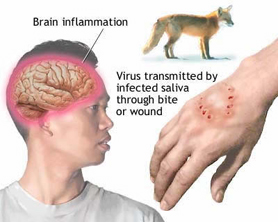Rabies is a lethal disease that is endemic in most parts of the world. Only a few countries are considered Rabies free. Australia is, fortunately, one such country. This means that for animals being bought into or taken out of Australia there are important facts that must be addressed. At Travel Vets all our veterinary staff is qualified to give advice on the medical procedures necessary to take your favourite companion overseas.
Important Points about Rabies:
- Rabies is considered universally fatal to un-vaccinated animals or people. Fortunately, in people that are aware they have been bitten, it is possible to get post-exposure treatments.
- Rabies can affect almost all warm-blooded animals
- Rabies has an extremely long and varied incubation period. One child was suggested that the incubation period was around 6 years before she died from the virus.
- Dogs account for 99% of all human rabies deaths. Urban Rabies (the sub-type that affects dogs) is the sole cycle in South East Asia and is the dominant cycle in Asia, Central and South America, and Africa. Dogs are the host and while they may infect other species. These secondary species do not spread the disease but will die. There are other sub-types of rabies that can cycle in other hosts such as skunks, foxes, raccoon and bats, the urban form is most important for Australia.
In Australia in most cases, it is unnecessary to vaccinate for Rabies. Most veterinarians cannot legally or administer Rabies Vaccines.
The Australian Government maintains a register of authorized veterinarians who can administer the rabies vaccine, mainly to animals travelling overseas. If you are planning such a trip it is advised you contact a D.A.F.F. registered veterinarian such as those at the Travel Vets to obtain information regarding preparing your pet for transport. For large numbers of animals, we can provide significant discounts to testing and vaccination.

